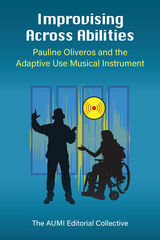1061 scholarly books by Catholic University of America Press and 87
have author last names that start with B
1061 scholarly books by Catholic University of America Press and 87
1061 scholarly books by Catholic University of America Press
87 have author last names that start with B have author last names that start with B
87 have author last names that start with B have author last names that start with B
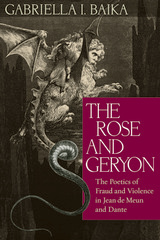
The Rose and Geryon
Gabriella I. Baika
Catholic University of America Press, 2014
The Rose and Geryon examines patterns of verbal behavior in works by Jean de Meun and Dante (with a focus on the Romance of the Rose and the Divine Comedy) in relationship with the most influential systems of verbal sins in the Middle Ages, systems elaborated by William Peraldus, Thomas Aquinas, Domenico Cavalca, and Laurent of Orléans. The book begins with a presentation of these four systems, and from there proceeds to analyze Jean de Meun's Testament as a possible source of influence for the Divine Comedy and take a closer look at Dante's prose works in search for a comprehensive theory of sinful speech. Furthermore Baika discusses verbal transgressions such as flattery, evil counsel, double talk, sowing of discord, and falsifying of words, under the heading Lingua dolosa "The Guileful Tongue," and the relationship between violence and the poetic discourse. The myriad ways in which the two iconic poets of medieval France and Italy absorb the tradition of peccata linguae in their works prove that abusive speech was not the exclusive sphere of interest of the ecclesiastical writers; secular poetry in the vernacular enriched in original ways the medieval debate on verbal vices. The Rose and Geryon addresses scholars and students of French and Italian literatures, as well as readers interested in ethics and women's studies.
[more]
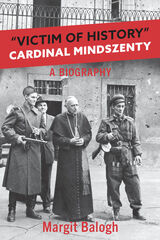
Victim of History
Cardinal Mindszenty, a biography
Margit Balogh
Catholic University of America Press, 2022
“Victim of history,” “a martyr from behind the Iron Curtain,” “the Hungarian Gandhi” – these are just some of the epithets which people used to describe Cardinal Mindszenty, archbishop of Esztergom, who was the last Hungarian prelate to use the title of prince primate. Today, Mindszenty has been forgotten in most countries except for Hungary, but when he died in 1975, he was known all over the world as a symbol of the struggle of the Catholic Church against communism.
Cardinal Mindszenty held the post of archbishop of Esztergom from 1945 until 1974, but during this period of almost three decades he served barely four years in office. The political police arrested him on December 26, 1948, and the Budapest People’s Court subsequently sentenced him to life imprisonment. Based on the Stalinist practice of show trials, one of the accusations against Mindszenty, referring to his legitimist leanings, was his alleged attempt to re-establish Habsburg rule in Hungary. He regained freedom during the 1956 revolution but only for a few days. He was granted refuge by the US Embassy in Budapest between November 4, 1956 –September 28, 1971. In the fifteen years he spent at the American embassy enormous changes took place in the world while his personality remained frozen into the past. When in 1971 Pope Paul VI received the Hungarian foreign minister, he called Mindszenty “the victim of history”. His last years were spent free at last, but far away from his homeland. In Hungary, the Catholic believers eagerly await his beatification.
[more]
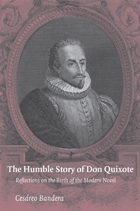
The Humble Story of Don Quixote
Reflections on the Birth of the Modern Novel
Cesáreo Bandera
Catholic University of America Press, 2006
In this original study by Cesáreo Bandera, the intimate connection between the simplicity and humility of the story and its greatness is explored. Other comparisons are also made: the story of the picaresque rogue, on the one hand, and the psychological insights of the pastoral novel, on the other.
[more]
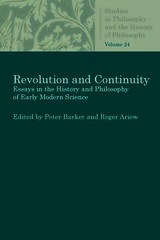
Revolution and Continuity
Peter Barker
Catholic University of America Press, 2018
This volume presents new work in history and historiography to the increasingly broad audience for studies of the history and philosophy of science. These essays are linked by a concern to understand the context of early modern science in its own context.
[more]

The Power of God
Dynamis in Gregory of Nyssa's Trinitarian Theology
Michel René Barnes
Catholic University of America Press, 2001
This study will be useful for those who study the development of the doctrine of the Trinity, as well as those who are interested in the role of scriptural and philosophical resources in Christian theology. Fi
[more]
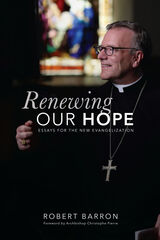
Renewing Our Hope
Essays for the New Evangelization
Robert Barron
Catholic University of America Press, 2020
In a time of discouragement, how can the Church renew itself and its outreach to all people? Bishop Robert Barron, Auxiliary Bishop of the Archdiocese of Los Angeles, insists that a "dumbed down" Catholicism cannot succeed in today's highly educated society--instead, the Church needs to draw upon its great theological heritage in order to renew its hope in Christ.
With Renewing Our Hope: Essays for the New Evangelization, Bishop Barron traces this renewal through four stages. "Renewing Our Mission" lays out the challenges that call for Catholics to become more aware of their own intellectual resources in encountering the "Nones." "Renewing Our Minds" showcases the importance of theological reflection as a font of wisdom and sanity in the Church, touching on Thomas Aquinas, Hans Urs von Balthasar, the recently canonized John Henry Newman, and Pope Francis. In "Renewing the Church," he proceeds to look at how Scripture, the family, the seminary, and Catholic college graduates can each contribute to this renewal. Finally, in "Renewing Our Culture," he returns to the judgments Catholics must make in assessing contemporary culture, specifically, family life, liberalism, relativism, and (surprisingly) the beauty of cinema.
Bishop Barron, known as the host of the Catholicism PBS video series, was previously rector and professor of systematic theology at Mundelein Seminary outside Chicago, Illinois. He demonstrates again in Renewing Our Hope his ability to make the fruits of his wide reading accessible to a broad audience, while still giving his academic colleagues much to consider.
[more]
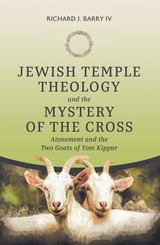
Jewish Temple Theology and the Mystery of the Cross
Atonement and the Two Goats of Yom Kippur
Richard J. Barry IV
Catholic University of America Press, 2023
On the Day of Atonement, two goats were brought before the high priest at the temple. One was chosen as the goat for the Lord, a spotless sacrifice, and the other was set aside for Azazel, doomed to bear sins into the wilderness. Jewish Temple Theology and the Mystery of the Cross shows how a theological appreciation for the two movements of Yom Kippur makes it possible to identify the paradox at the heart of Christian soteriology: in his single atoning act, Jesus Christ fulfills the work of both goats, without confusion, without division. Appreciation for this paradox helps illuminate many of the doctrinal debates in the history of Christian soteriology and offers a compelling way forward.
Jewish Temple Theology and the Mystery of the Cross begins with a survey of biblical geography: first, a rich theological pilgrimage to Mount Zion, the home of beauty, goodness, and truth, and then to the surrounding desert, the wilderness of sin and sorrow. To appreciate the Yom Kippur liturgy, and to understand the priestly word “atonement,” one must be oriented by this cosmic stage. Drawing on the best modern historical-critical scholarship, this volume reveals the wonders hidden in Leviticus and shows how a sophisticated theological interpretation of this book leads to breakthroughs in our understanding of Christ’s saving work.
Seeing the mystery of the cross from the perspective of the ancient Jewish scriptures has surprising results. For example, Richard Barry shows how Hans Urs von Balthasar’s controversial theology of Holy Saturday is a compelling development of Azazel-goat soteriology; it is not only biblically licit but is in some ways mandated by the logic of Yom Kippur. At the same time, David Bentley Hart is celebrated for the way he powerfully advances modern YHWH-goat soteriology, yet obedience to the logic of Yom Kippur also necessitates a nuanced biblical critique of his muscular universalism.
How can Christ fulfill the seemingly contradictory movements of both goats in a single saving work? Grappling with that question, Jewish Temple Theology and the Mystery of the Cross seeks to draw nearer to the heart of the mystery of salvation.
[more]
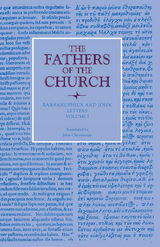
Letters, Volume 1
John Barsanuphius and John
Catholic University of America Press, 2006
No description available
[more]
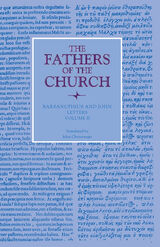
Letters, Volume 2
John Barsanuphius and John
Catholic University of America Press, 2006
No description available
[more]
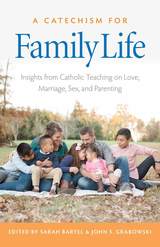
A Catechism for Family Life
Sarah Bartel
Catholic University of America Press, 2018
The purpose of A Catechism for Family Life: Insights from Catholic Teaching on Love, Marriage, Sex, and Parenting is to present the teachings of the Catholic Church as they relate to specific questions in marriage and family life. Many Catholics are under-catechized and have trouble both understanding and articulating Church teaching on sexuality and marriage to an increasingly challenging culture. Pope Francis, along with the fathers of the two recent Synods on the Family, have called for better formation for those who work in the area of marriage and family life (see Amoris Laetitia, 202).
To address this need, we gathered pertinent questions facing men, women, and pastoral workers in marriage and family life. We then found passages relevant to these questions by researching Church documents on marriage and family from the past one hundred years. These include papal encyclicals, apostolic exhortations, and addresses, Vatican II documents, and the Catechism of the Catholic Church.
Mainstream media coverage of Church events and Church teaching leads many to misunderstand Catholic positions on marriage and family life. While the Catholic Church has developed a rich, detailed, and positive teaching on marriage, family, and sexuality, many Catholics do not have access to this teaching, buried as it is in lengthy Church documents which many find intimidating. Finding the relevant teaching to address specific questions is not always a simple task, either. This book’s main contribution is to present Church teaching relevant to marriage and family in one volume clearly organized by topic and question.
To address this need, we gathered pertinent questions facing men, women, and pastoral workers in marriage and family life. We then found passages relevant to these questions by researching Church documents on marriage and family from the past one hundred years. These include papal encyclicals, apostolic exhortations, and addresses, Vatican II documents, and the Catechism of the Catholic Church.
Mainstream media coverage of Church events and Church teaching leads many to misunderstand Catholic positions on marriage and family life. While the Catholic Church has developed a rich, detailed, and positive teaching on marriage, family, and sexuality, many Catholics do not have access to this teaching, buried as it is in lengthy Church documents which many find intimidating. Finding the relevant teaching to address specific questions is not always a simple task, either. This book’s main contribution is to present Church teaching relevant to marriage and family in one volume clearly organized by topic and question.
[more]
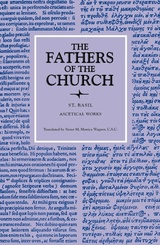
Ascetical Works
Saint Basil
Catholic University of America Press, 1950
No description available
[more]
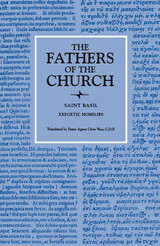
Exegetic Homilies
Saint Basil
Catholic University of America Press, 1963
No description available
[more]
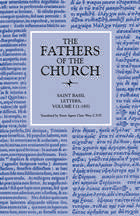
Letters, Volume 1 (1–185)
Saint Basil
Catholic University of America Press, 1951
No description available
[more]
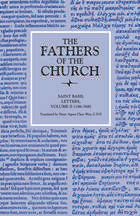
Letters, Volume 2 (186–368)
Saint Basil
Catholic University of America Press, 1955
No description available
[more]
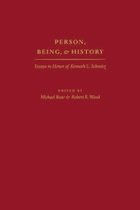
Person, Being, and History
Michael Baur
Catholic University of America Press, 2011
the various essays in this volume by colleagues and former students of Schmitz examine his thought and the subjects of his teaching. In addition to an overall exposition of his own thought, the collection treats themes such as gift, faith and reason, culture and dialogue, modernity and post-modernity
[more]
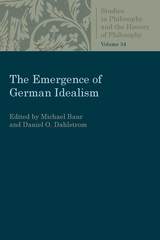
The Emergence of German Idealism
Michael Baur
Catholic University of America Press, 2018
Immanuel Kant's "critical philosophy" is rightly renowned for its criticism of the metaphysical pretensions of reason unaided by experience. It therefore seems ironic that, within a single generation, some of Kant's most important followers argued that th
[more]
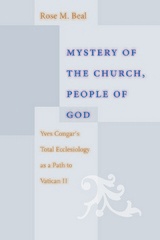
Mystery of the Church, People of God
Rose Beal
Catholic University of America Press, 2014
Congar coined the term "total ecclesiology" in his ground-breaking outline for a theology of the laity, A Way towards a Theology of the Laity. In Mystery of the Church, People of God, Rose M. Beal argues that "total ecclesiology" is the necessary and appropriate lens for a comprehensive interpretation of Congar's ecclesiological project prior to the Second Vatican Council (1962-1965). Beal works from Congar's published works from 1931 to 1954, as well as from unpublished texts from the same time period, to integrate and propose a comprehensive interpretation of his ecclesiological purposes and methods.
[more]
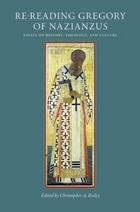
Re-Reading Gregory of Nazianzus
Christoper A. Beeley
Catholic University of America Press, 2012
This book, the newest volume in the CUA Studies in Early Christianity, presents original works by leading patristics scholars on a wide range of theological, historical, and cultural topics
[more]
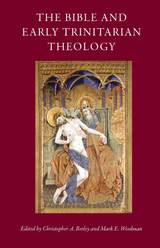
The Bible and Early Trinitarian Theology
Christopher A. Beeley
Catholic University of America Press, 2018
The past thirty years have seen an unprecedented level of interest in early Christian biblical interpretation, from major scholarly initiatives to more popular resources aimed at pastors and general readers. The fields of Biblical Studies and Patristics/Early Christian Studies each arrived at the study of early Christian biblical interpretation largely from their own standpoints, and they tend to operate in relative isolation from one another. This books aims to bring the two fields into closer conversation, in order to suggest new avenues into the study of the deeply biblical dimension of patristic theology as well as the contribution that patristic exegesis can make to contemporary views of how best to interpret the Bible.
Based on a multi-year consultation in the Society of Biblical Literature, The Bible and Early Trinitarian Theology features leading scholars from both fields, who bring new insights to the relationship between patristic exegesis and current strategies of biblical interpretation, specifically with reference to the doctrine of the Trinity. Following an account of how each field came to study patristic exegesis, the book offers new studies of Trinitarian theology in Old Testament, Johannine, and Pauline biblical texts and the patristic interpretation of them, combining the insights of modern historical criticism with classical historical theology. It promises to make a valuable contribution to both fields, suggesting several new avenue into the study of early biblical literature and the development of Trinitarian theology.
Based on a multi-year consultation in the Society of Biblical Literature, The Bible and Early Trinitarian Theology features leading scholars from both fields, who bring new insights to the relationship between patristic exegesis and current strategies of biblical interpretation, specifically with reference to the doctrine of the Trinity. Following an account of how each field came to study patristic exegesis, the book offers new studies of Trinitarian theology in Old Testament, Johannine, and Pauline biblical texts and the patristic interpretation of them, combining the insights of modern historical criticism with classical historical theology. It promises to make a valuable contribution to both fields, suggesting several new avenue into the study of early biblical literature and the development of Trinitarian theology.
[more]
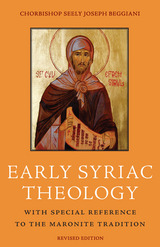
Early Syriac Theology
Chorbishop Seely Joseph Beggiani
Catholic University of America Press, 2014
Presents the insights of St. Ephrem and Jacob of Serugh, two of the earliest representatives of the theological world-view of the Syriac church.
[more]
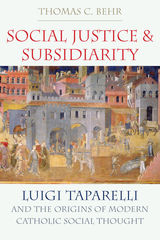
Social Justice and Subsidiarity
Luigi Taparelli and the Origins of Modern Catholic Social Thought
Thomas C. Behr
Catholic University of America Press, 2020
Luigi Taparelli, SJ, 1793-1862, in his Theoretical Treatise of Natural Right Based on Fact, 1840-43, presents a neo-Thomistic approach to social, economic, and political sciences grounded in an integral conception of the human person as social animal but also as rational truth seeker. His conceptions of social justice and of subsidiarity are fundamental to modern Catholic social teaching (CST). His work moves away from traditionalist-conservative reaction in favor of an authentically human, moderately liberal, modernity built on the harmony of faith and reason. He zealously deconstructs laissez-faire liberal ideology and its socialist progeny in scores of articles in the Civiltà Cattolica, the journal that he co-founded in 1850. His arguments figure prominently in the Syllabus of Errors (1864) of Pius IX. Though a moderate liberal himself, his reputation as anti-liberal reactionary and defender of Papal temporal sovereignty is the chief reason why Pope Leo XIII later sought to quiet Taparelli’s contribution to the foundations and pillars of modern CST that began with the restoration of Thomistic philosophy in Aeterni Patris (1879), and the “magna carta” of modern Catholic social teaching, Rerum Novarum (1891). Pius XI relies heavily on Taparelli’s concept of subsidiarity in Quadragesimo Anno (1931), and sought to advance interest in Taparelli studies. However, Taparelli’s eclectic philosophical orientation and writing style have been a considerable stumbling block. In this present book, Taparelli’s ideas are evaluated both for their philosophical character but also in their historical context. Taparelli’s theories of the just society and ordered liberty, are as timely nowadays for reasoned political and ethical discourse as ever. The book includes an appendix of translated portions of the Theoretical Treatise of Natural Right Based on Fact that relate to subsidiarity.
[more]
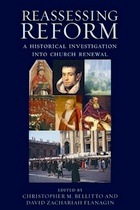
Reassessing Reform
Christopher M. Bellitto
Catholic University of America Press, 2012
Now, in celebration of the fiftieth anniversaries of the publication of The Idea of Reform and the Second Vatican Council, Reassessing Reform explores and critiques the enduring significance of Ladner's study, surveying new avenues and insights of more recent reform scholarship, especially concerning the long Middle Ages.
[more]
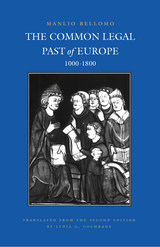
The Common Legal Past of Europe, 1000–1800
Manlio Bellomo
Catholic University of America Press, 1995
With a vigor and passion rarely found in a scholarly text, Manlio Bellomo has written a broad history of the western European legal tradition. It is now made available to an English-speaking audience in an elegant and lucid translation from the original Italian.
[more]
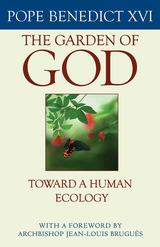
The Garden of God
Pope Benedict XVI
Catholic University of America Press, 2014
This book gathers together the audiences, addresses, letters, and homilies of Benedict on a wide-ranging set of topics that deal with the world about us. The major themes and connections he explores are creation and the natural world; the environment, science, and technology; and hunger, poverty, and the earth's resources.
[more]
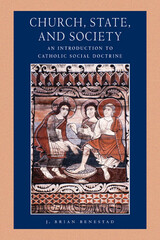
Church, State, and Society
An Introduction to Catholic Social Doctrine
J. Brian Benestad
Catholic University of America Press, 2011
Church, State, and Society explains the nuanced understanding of human dignity and the common good found in the Catholic intellectual tradition.
[more]
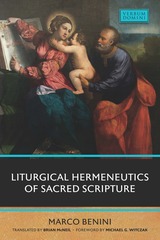
Liturgical Hermeneutics of Sacred Scripture
Marco Benini
Catholic University of America Press, 2023
The purpose of this book is to explore what a liturgical approach to the Bible looks like and what hermeneutical implications this might have: How does the liturgy celebrate, understand, and communicate Scripture? The starting point is Pope Benedict's affirmation that “a faith-filled understanding of sacred Scripture must always refer back to the liturgy” (Verbum Domini 52).
The first part of the book (based on SC 24) provides significant examples to demonstrate: The liturgical order of readings intertextually combines Old Testament and New Testament readings using manifold hermeneutical principles, specifically how the psalms show the wide range of interpretations the liturgy employs. Prayers are biblically inspired and help to appropriate Scripture personally. The hymns convey Scripture in a poetic way. Signs and actions such as foot-washing or the Ephphetha rite enact Scripture. The study considers the Mass, the sacraments and the Liturgy of the Hours.
In the second part, Benini systematically focuses on the various dimensions of liturgical hermeneutics of the Bible, which emerge from the first part. The study reflects the approaches the liturgy offers to Scripture and its liturgical reception. It explores theological aspects such as the unity of the two Testaments in Christ’s paschal mystery or the anamnesis as a central category in both Scripture and liturgy. The liturgy does not understand Scripture primarily as a document of the past, but celebrates it as a current and living “Word of the Lord,” as a medium of encounter with God: Scripture is sacramental.
Liturgical Hermeneutics of Sacred Scripture seeks to contribute not only to the comparison of the Roman, Ambrosian, and Byzantine Rite regarding the Word of God, but most of all to the overall “liturgical approach” to Scripture. As such, it promotes an interdisciplinary dialogue of liturgical and biblical studies.
[more]
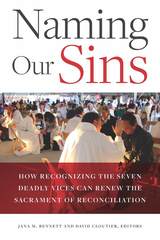
Naming Our Sins
How Recognizing the Seven Deadly Vices can Renew the Sacrament of Reconciliation
Jana Bennett
Catholic University of America Press, 2019
What would it take to renew our ability to name our sins in a meaningful and pertinent way? Naming sins is a particularly important task for Catholic moral theology, but it is one that often falls back into a paradigm of simple violations of rules. While laws and commandments are essential, Vatican II’s universal call to holiness and the revival of virtue ethics require moving further. Yet in part because moral theologians today tend to be lay people, not priests, there has been a de-emphasis on the confession of sins. Contemporary questions like poverty, racism, and abortion are usually connected to questions about sin in some way, but they are disconnected from the idea of naming specific sins in the sacrament of penance. Lay moral theologians raise these issues in a way that makes clear their implications for a parish social justice committee (or the voting booth), but not their implications for the naming of sins in the sacrament of reconciliation. Naming Our Sins proposes to re-make that connection: the moral theologian’s task of helping people name individual sins needs to be restored, though in ways distinctive from dominant pre-Vatican II notions.
In this volume, editors Jana Bennett and David Cloutier gather some of the best of the current generation of moral theologians in order to reflect on the classic tradition of the vices. It is crucial to the Christian understanding of sin that we recognize (a) we bear at least some responsibilities for injuries, and (b) God wants us to participate in the process of healing and conversion. Neither the sin itself nor the healing simply come from somewhere else; the task of naming sins enlists us as mature, growing disciples.
Each chapter takes on a different classical vice, describing the vice, exploring its dimensions in contemporary experience, and moving the reader toward naming specific sins that arise from the vice. The concluding chapters from Catholic priests explore two basic dimensions of the sacrament of penance: liturgical and communal.
[more]
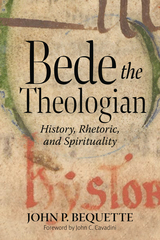
Bede the Theologian
History, Rhetoric, and Spirituality
John P. Bequette
Catholic University of America Press, 2022
Revered by contemporaries and posterity for both his sanctity and his scholarship, Bede (672-735) is a pivotal figure in the history of the Church. Known primarily as an historian for his Ecclesiastical History of the English People, Bede was also an accomplished pedagogue, hagiographer, and biblical scholar. Bede the Theologian: History, Rhetoric, and Spirituality takes a fresh look at this classic Christian thinker, exploring the gamut of Bede’s literary corpus. The book investigates key themes, including Bede’s understanding of the theological significance of time, his conception of the relationship between the temporal and eternal orders within history, his theological use of rhetoric, his foray into narrative theology, and his spirituality.
The purpose of this volume is to introduce the reader to principal theological themes in Bede’s thought. Bequette’s thesis is that Bede was a theologian writing in continuity with the Christian tradition and yet making creative, original contributions to that tradition for the sake of his contemporaries, both in the monastery and in the culture at large. The method involves a close reading and analysis of key texts within Bede’s corpus of writings. These texts include the Ecclesiastical History of the English People, the Life of St Cuthbert, and several of Bede’s biblical commentaries (On the Tabernacle, On the Temple) his homilies, and didactic treatises (On the Reckoning of Time, Concerning Figures and Tropes in Sacred Scripture). Bede the Theologian: History, Rhetoric, and Spirituality constitutes a scholarly study of Bede’s thought as an integral whole, identifying key themes and ideas that pervade his writings. Thus, it can serve as an introduction to Bede’s thought for non-specialists in the areas of theology, religious studies, and other areas of the humanities.
[more]
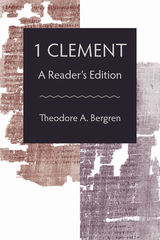
1 Clement
A Reader's Edition
Theodore A. Bergren
Catholic University of America Press, 2020
The present volume is a "reader's edition" of 1 Clement, an important early Christian epistolary writing in Greek that probably dates from the late first century CE. The volume is designed for rapid reading and for classroom use. On each left-facing page is printed a running, sequential section of the Greek text. Next to that, on each right-facing page, are recorded all of the more unusual words in that section of Greek text, with dictionary form, part of speech, and definition(s). All of the more common words in that same section of Greek text are included in a comprehensive glossary at the end of the book.
This system, then, is designed so that the reader of the Greek text will not have to stop to look up every unusual Greek word in a printed or online dictionary. He or she will simply have to look to the facing page. Such constant lookups in a printed or online dictionary are tedious and time-consuming, and have little pedagogical value. Since in the present edition the words recorded on the right-facing page are not parsed, the reader is still faced with the challenge of parsing the word and determining its place in the overall structure of the sentence. It is this process that does serve a useful pedagogical purpose, and the present system preserves the challenge of this process.
The introduction to the volume covers (1) 1 Clement’s genre, date, setting in life, purpose, sources, and main themes; (2) the compositional outline of the book; (3) the book’s authorship, history of reception, and textual attestation; (4) discussion of the present “reader’s edition”; (5) a list of scriptural quotations and allusions; and (6) a comprehensive bibliography on the text of 1 Clement.
[more]
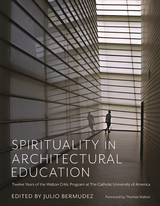
Spirituality in Architectural Education
Twelve Years of the Walton Critic Program at The Catholic University of America
Julio Bermudez
Catholic University of America Press, 2021
How does spirituality enter the education of an architect? Should it? What do we mean by ‘spirituality’ in the first place? Isn’t architectural education a training ground for professional practice and, therefore, technically and secularly oriented? Is there even room to add something as esoteric if not controversial as spirituality to an already packed university curriculum? The humanistic and artistic roots of architecture certainly invite us to consider dimensions well beyond the instrumental, including spirituality. But how would we teach such a thing? And why, if spirituality is indeed relevant to learning architecture, have we heard so little about it?
Spirituality in Architectural Education addresses these and many other important philosophical, disciplinary, pedagogic, and practical questions. Grounded on the twelve-year-old Walton Critic Program at the Catholic University of America School of Architecture and Planning, this book offers solid arguments and insightful reflections on the role that “big questions” and spiritual sensibility ought to play in the architectural academy today. Using 11 design studios as stopping grounds, the volume takes the reader into a journey full of meaningful interrogations, pedagogic techniques, challenging realizations, and beautiful designs. Essays from renowned architects Craig W. Hartman, Juhani Pallasmaa, Alberto Campo Baeza, Claudio Silvestrin, Eliana Bórmida, Michael J. Crosbie, Prem Chandavarkar, Rick Joy, Susan Jones, and Daniel Libeskind open new vistas on the impact of spirituality in architectural education and practice. All this work is contextualized within the ongoing discussion of the role of spirituality and religion in higher education at large. The result is an unprecedented volume that starts a long-awaited conversation that will advance architectural schooling. ACSA Distinguished Professor Julio Bermudez, with recognized expertise on spirituality in architecture, will be the guide in this fascinating and contemplative journey.
[more]
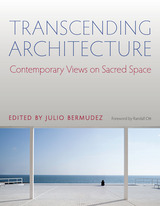
Transcending Architecture
Julio Bermudez
Catholic University of America Press, 2015
Please fill in marketing copy
[more]

Maurice Blondel, Social Catholicism, and Action Française
The Clash over the Church's Role in Society during the Modernist Era
Peter J. Bernardi
Catholic University of America Press, 2009
This work casts light on contemporary arguments over social Catholicism and the believer's role in society by illuminating a similar dispute among French Catholics during the Modernist Crisis (1909-1914)
[more]
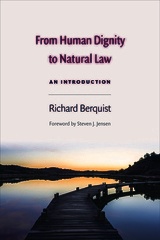
From Human Dignity to Natural Law
An Introduction
Richard Berquist
Catholic University of America Press, 2019
From Human Dignity to Natural Law shows how the whole of the natural law, as understood in the Aristotelian Thomistic tradition, is contained implicitly in human dignity. Human dignity means existing for one’s own good (the common good as well as one’s individual good), and not as a mere means to an alien good. But what is the true human good? This question is answered with a careful analysis of Aristotle’s definition of happiness. The natural law can then be understood as the precepts that guide us in achieving happiness.
To show that human dignity is a reality in the nature of things and not a mere human invention, it is necessary to show that human beings exist by nature for the achievement of the properly human good in which happiness is found. This implies finality in nature. Since contemporary natural science does not recognize final causality, the book explains why living things, as least, must exist for a purpose and why the scientific method, as currently understood, is not able to deal with this question. These reflections will also enable us to respond to a common criticism of natural law theory: that it attempts to derive statements of what ought to be from statements about what is.
After defining the natural law and relating it to human or positive law, Richard Berquist considers Aquinas’s formulation of the first principle of the natural law. It then discusses the love commandments to love God above all things and to love one’s neighbor as oneself as the first precepts of the natural law. Subsequent chapters are devoted to clarifying and defending natural law precepts concerned with the life issues, with sexual morality and marriage, and with fundamental natural rights. From Human Dignity to Natural Law concludes with a discussion of alternatives to the natural law.
[more]
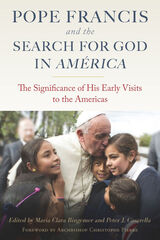
Pope Francis and the Search for God in America
The Significance of His Early Visits to the Americas
Maria Clara Bingemer
Catholic University of America Press, 2021
In Tutti Fratelli, Pope Francis has called again for a “culture of encounter,” But how should his theology, pastoral practice, and social message be understood and applied in the Church of the Americas, a single but complex reality that extends from South to North? This volume offers analyses from experts looking back to the Argentine pontiff’s first fateful encuentros in the Americas as a help for understanding the present reality of the Church in the Western Hemisphere. The group includes theologians, historians, and political scientists, and the unique contribution of the volume lies in the panoramic perspective offered by the book as a whole.
The initial essays set the stage for the volume as a whole, offering rich insight into Argentine and Latin American history, the world from which the Pope came and to which he returned in 2015, as well as surveying the impact of the Latin American “theology of the people” on the Pope’s visit to the U.S.
Additional essays address theological, historical, and pastoral engagements that cut across several of the visits. The final group of essays is dedicated to the visits themselves and is arranged in the order that they occurred. Pope Francis and the Search for God in América is offered to all the members of the Church in América, South and North, old and young, with the hope that it will spur even more thought, reflection, prayer, and service.
[more]

Jansenism
An International Anthology
Shaun Blanchard
Catholic University of America Press, 2024
Jansenism: An International Anthology is the first comprehensive anthology of Jansenist texts in English translation. Covering the full sweep of the Jansenist movement from the 1630s until the early nineteenth century, this anthology is a major asset to historians of early modernity, theologians, advanced and beginner students, and interested non-specialists. Readers of English can now directly hear the voices of the women and men, nuns and priests, and politicians and pamphleteers embroiled in some of the most dynamic controversies of early modern Christianity.
While giving due attention to France, the anthology showcases the geographic breadth of Jansenism, from Portugal to Lebanon. Consequently, a team of translators have provided texts translated not just from French and Latin; selections from German, Spanish, Portuguese, Italian, and Arabic also appear here. Blanchard and Yoder present a diverse range of texts, including letters, tracts, periodical excerpts, books, treatises, and synodal documents.
These readings cover the controversies over divine grace and penance for which Jansenism is infamous, but they also show the widening scope of Jansenists’ reformist concerns as the movement developed and changed. They address issues such as liturgical reform, devotion to Mary and the saints, politics, religious toleration, prayer, gender and the role of women in the Church, polemics, and ecclesiastical reform. The whole volume is introduced by an essay introducing Jansenism, exposing the important themes, summarizing the relevant scholarship, and contextualizing the content that will follow.
Jansenism: An International Anthology provides the first port-of-call for the study of Jansenism in English. The anthology presents a diverse and rich selection of primary source texts and draws on the best recent research into the fascinating and controversial transnational phenomena called “Jansenism.”
[more]
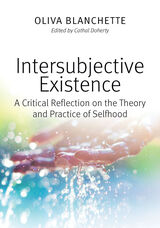
Intersubjective Existence
A Critical Reflection on the Theory and the Practice of Selfhood
Oliva Blanchette
Catholic University of America Press, 2021
Intersubjective Existence, as the author notes, aims, first, to develop a wisdom about human life that takes the form of a theory of selfhood and, second, to reflect on what is called for in the ethical practice of human existence. Secondly, the ethical implications of this theory of selfhood are
explored, specifically looking at conscience, prudential reasoning, justice, friendship, the law, temperance, courage, and concluding with a brief treatment of religion.
Olivia Blanchette charts the path of his inquiry through an analysis of reflective self-consciousness in selves communing with one another. They are constituted in their substance as a union of body and soul, with intelligence and free will that give rise to cultures in communion with other selves. These cultures are over and above what is given to each self in sense consciousness and in sense appetites and which each one contends with in the exercise of selfhood and the rights that go with that in keeping with justice. Concern for right reasoning and justice leads to an analysis of temperance and courage.
The chief arguments take the form of phenomenological reflections on the building blocks of the perennial philosophy. Blanchette recasts Aristotelian-Thomistic metaphysics from the perspective of a phenomenology of the mutual recognition of agents and the historical consciousness to which it gives rise.
[more]
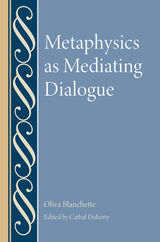
Metaphysics as Mediating Dialogue
Olivia Blanchette
Catholic University of America Press, 2023
Metaphysics is not often spoken of as a venue for dialogue about anything, let alone culture or religion, which are more readily associated with phenomenology or hermeneutics in contemporary thinking. This collection of essays, however, by the late Boston College philosopher Oliva Blanchette, maintains the absolute necessity of metaphysics as a prerequisite for examining any particular ‘realm of being,’ in all areas of human inquiry, from the particular sciences to historical cultures and religions. Blanchette proposes metaphysics as a fundamental and necessary level of intelligence presupposed in any exercise of judgment, discourse, or dialogue, among rational beings. At the same time, he defends the idea that dialogue is the first and most fundamental form in which such reasoning takes place in human experience, on a radically intersubjective level through language.
Metaphysics is not an abstraction removed from human experience. Rather, it is a science in its own right defining itself in relation to ‘being as being’, its subject matter, as it depends on all the particular sciences and bodies of knowledge. Firmly standing on the ground of human experience, and on the human person as primary analogate of being, it opens up an entire realm of questioning that the particular sciences and bodies of knowledge, operating in functional separation, cannot pose on their own, especially when they take, in a reductionist fashion, their own object to be the prime analogate.
Metaphysics, in fact, insinuates itself into each and every particular science in exploring its own subject matter of ‘being as being’ in the analogical sense, advancing to more and more complex stages of analogy through dialogue among different spirits and cultures, and reaching its terminus in the transcendent aspect of spirit and religion. In this sense, metaphysics has much to say to theologians: without metaphysics, theology reduces to mere superstition.
[more]
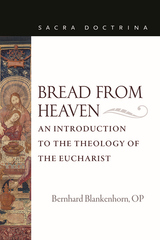
Bread from Heaven
An Introduction to the Theology of the Eucharist
Bernhard Blankenhorn
Catholic University of America Press, 2021
Bread from Heaven offers a contemporary theological synthesis on the Eucharist that brings together classical and critical biblical exegesis, debates on the early history of the Christian liturgy, patristic doctrine, the teachings offered by the Councils of Florence, Trent and Vatican II, and the Church’s lex orandi, all within a framework provided by the Eucharistic theology of Thomas Aquinas.
The volume begins with Christ’s Bread of Life discourse in John 6, in light of the Old Testament theme of the manna, and the Synoptic accounts of the Last Supper. These biblical texts offer solid foundation for a theology of Eucharistic sacrifice, presence and Communion. It then continues with a historical and systematic study of the institution of the Eucharist by Christ, with special attention given to the emergence of the first Eucharistic prayers. Then follows a survey of key Christological and ecclesiological themes which undergird Eucharistic theology. The chapters on Eucharistic sacrifice and presence form the heart of the work. Here, the focus moves to key conciliar, patristic and Thomistic insights on these themes. Bread from Heaven clarifies misunderstandings of Eucharistic sacrifice and renders transubstantiation accessible to beginners.
Blankenhorn concludes with a study of the consecration, the minister of the Eucharist and the fruits of communion. The chapter on the debate over the words of institution and the epiclesis gives a fresh perspective that integrates both eastern and western tradition. The study of the Eucharistic celebrant strikes a balance between a spirituality of the priest as acting in persona Christi and of the priest as praying in persona ecclesiae. The concluding chapter centers on the Eucharist’s unitive, mystical fruits in the Church.
This textbook is ideal for an advanced undergraduate or graduate course on Eucharistic theology. It also seeks to advance the debate on several controversial historical and speculative issues in sacramental theology.
[more]
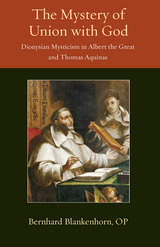
The Mystery of Union with God
Bernhard Blankenhorn
Catholic University of America Press, 2015
The Mystery of Union with God offers the most extensive, systematic analysis to date of how Albert and Thomas interpreted and transformed the Dionysian Moses "who knows God by unknowing." It shows Albert's and Thomas's philosophical and theological motives to place limits on Dionysian apophatism and to reintegrate mediated knowledge into mystical knowing. The author surfaces many similarities in the two Dominicans' mystical doctrines and exegesis of Dionysius. This work prepares the way for a new consideration of Albert the Great as the father of Rhineland Mysticism. The original presentation of Aquinas's theology of the Spirit's seven gifts breaks new ground in theological scholarship. Finally, the entire book lays out a model for the study of mystical theology from a historical, philosophical and doctrinal perspective.
[more]
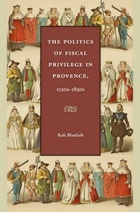
The Politics of Fiscal Privilege in Provence, 1530s-1830s
Rafe Blaufarb
Catholic University of America Press, 2012
Rafe Blaufarb examines the interwoven problems of taxation and social privilege in this treatment of the contention over fiscal privilege between the seigneurial nobility and the tax-payers of Provence
[more]
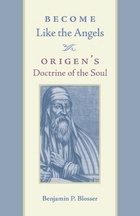
Become Like the Angels
Benjamin P. Blosser
Catholic University of America Press, 2012
Become Like the Angels explores Origen's legacy and, in particular, his teachings about the origin, nature, and destiny of the human person. By way of a historical critical approach, Benjamin P. Blosser discusses the influence of Middle Platonic philosophy on the human soul and then compares it with Origen's teaching.
[more]
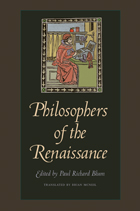
Philosophers of the Renaissance
Paul Richard Blum
Catholic University of America Press, 2010
Philosophers of the Renaissance introduces readers to philosophical thinking from the end of the Middle Ages through the sixteenth century.
[more]
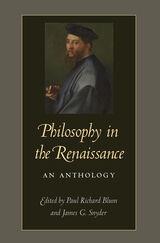
Philosophy in the Renaissance
An Anthology
Paul Richard Blum
Catholic University of America Press, 2022
The Renaissance was a period of great intellectual change and innovation as philosophers rediscovered the philosophy of classical antiquity and passed it on to the modern age. Renaissance philosophy is distinct both from the medieval scholasticism, based on revelation and authority, and from philosophers of the seventeenth and eighteenth centuries who transformed it into new philosophical systems.
Despite the importance of the Renaissance to the development of philosophy over time, it has remained largely understudied by historians of philosophy and professional philosophers. This anthology aims to correct this by providing scholars and students of philosophy with representative translations of the most important philosophers of the Renaissance. Its purpose is to help readers appreciate philosophy in the Renaissance and its importance in the history of philosophy. The anthology includes translations from philosophers from the thirteenth to the seventeenth centuries, and it ranges from works on moral and political philosophy, to metaphysics, epistemology, and natural philosophy, thereby providing historians and students of philosophy with a sense for the nature, breadth, and complexity of philosophy in the Renaissance. Each translation is accompanied by an introduction by a historian of Renaissance philosophy, as well as select secondary sources, in order to encourage further study.
This anthology is a companion to Philosophers of the Renaissance, edited by Paul Richard Blum and published by Catholic University of America Press in 2010, which included essays on the writings of the same group of philosophers of the Renaissance: Raymond Llull, Gemistos Plethon, George of Trebizond, Basil Bessarion, Lorenzo Valla, Nicholas of Cusa, Leon Battista Alberti, Giovanni Pico della Mirandola, Marsilio Ficino, Pietro Pomponazzi, Niccolò Machiavelli, Heinrich Cornelius Agrippa von Nettesheim, Juan Luis Vives, Philipp Melanchthon, Petrus Ramus, Bernardino Telesio, Jacopo Zabarella, Michel de Montaigne, Francesco Patrizi, Giordano Bruno, Francisco Suàrez, Tommaso Campanella.
[more]
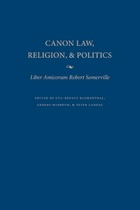
Canon Law, Religion, and Politics
"Liber Amicorum" Robert Somerville
Uta-Renate Blumenthal
Catholic University of America Press, 2012
Canon Law, Religion, and Politics extends and honors the work of the distinguished historian Robert Somerville, a preeminent expert on medieval church councils, law, and papal history.
[more]
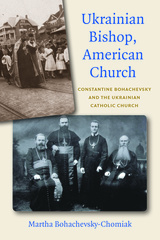
Ukrainian Bishop, American Church
Martha Bohachevsky-Chomiak
Catholic University of America Press, 2018
Constantine Bohachevsky was not a typical bishop. On the eve of his unexpected nomination as bishop to the Ukrainian Catholics in America, in March 1924, the Vatican secretly whisked him from Warsaw to Rome to be ordained. He arrived in America that August to a bankrupt church and a hostile clergy. He stood his ground, and chose to live а simple missionary life. He eschewed public pomp, as did his immigrant congregations. He regularly visited his scattered churches. He fought a bitter fight for the independence of the church from outside interference – a kind of struggle between the Church and the state, absent both. He refashioned a failing immigrant church in America into a self-sustaining institution that half a century after his death could help resurrect the underground Catholic Church in Ukraine, which became the largest Eastern Catholic church today. This trailblazing biography, based on recently opened sources from the Vatican, Ukraine and the United States, brings the reader from the placid life of the married Catholic Ukrainian clergy in the Habsburg Empire to industrial America.
[more]
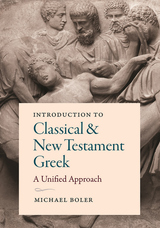
Introduction to Classical and New Testament Greek
A Unified Approach
Michael Boler
Catholic University of America Press, 2020
The defining feature of this textbook is the treatment of classical and New Testament Greek as one language using primary sources. All the example sentences the students will translate are real Greek sentences, half of which are taken from classical literature and philosophy and half of which are directly from the New Testament. The advantage of this approach is that it highlights the linguistic, literary, and historical connections between classical Greece and early Christianity. Rather than having students memorize isolated tables and artificial sentences, Michael Boler spent years combing through thousands of pages of literature, philosophy, and scripture to find short, powerful sentences that not only teach the grammatical concepts in each chapter, but also contain seeds of wisdom that will spark wonder and discussion.
Introduction to New Testament and Classical Greek is born out of classroom experience in a Catholic liberal arts university whose students were disappointed to be forced to choose between textbooks that taught classical Greek in isolation and ones that focused exclusively on the New Testament. By the end of this book, students will have read over 200 lines of scripture and an equal amount of ancient literature from Homer to Aristotle. They will also have the grammatical knowledge to continue to read classical and New Testament Greek. Each chapter contains a section at the end that delves deeply into the etymology and background of the words and passages encountered in the respective chapter. Professors will thus be able to use these chapters as a bridge to philosophical, theological, historical, and literary topics that will enrich the class.
[more]
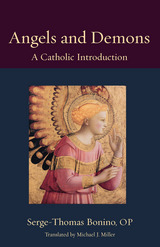
Angels and Demons
Serge-Thomas Bonino
Catholic University of America Press, 2016
Angels occupy a significant space in contemporary popular spirituality. Yet, today more than ever, the belief in the existence of intermediary spirits between the human and divine realms needs to be evangelized and Christianized. Angels and Demons offers a detailed synthesis of the givens of the Christian tradition concerning the angels and demons, as systematized in its essential principles by St. Thomas Aquinas. Certainly, the doctrine of angels and demons is not at the heart of Christian faith, but its place is far from negligible. On the one hand, as part of faith seeking understanding, angelology has been and can continue to be a source of enrichment for philosophy. Thus, reflection on the ontological constitution of the angel, on the modes of angelic knowledge, and on the nature of the sin of Satan can engage and shed light on the most fundamental areas of metaphysics, epistemology, and ethics. On the other hand, angelology, insofar as it is inseparable from the ensemble of the Christian mystery (from the doctrine of creation to the Christian understanding of the spiritual life), can be envisioned from an original and fruitful perspective.
[more]
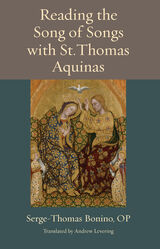
Reading the Song of Songs with St. Thomas Aquinas
Serge-Thomas Bonino
Catholic University of America Press, 2022
St. Thomas Aquinas never commented on the Song of Songs. The purpose of this book is to demonstrate, however, that he meditated on it and absorbed it, so that the words of the Song are for him a familiar repertoire and a theological source. His work contains numerous citations of the Song, not counting his borrowings of vocabulary and images from it. In total, there are 312 citations of the Song in Aquinas’s corpus, along with citations of the Song that are found in citations that Aquinas makes of other authors (as for example in the Catena aurea). Understanding the purpose and placement of these citations significantly enriches our understanding of Aquinas as a theologian, biblical exegete, and spiritual master. The book contains an Appendix listing and contextualizing each citation.
The study of the citations of the Song especially illuminates Aquinas’s spiritual doctrine. By citing the Song, Aquinas emphasizes the spiritual life’s path of dynamic ascent, through an ever increasing participation in the mystery of the nuptial union of Christ and the Church through love. The Song also highlights the eschatological tension or yearning present in the spiritual life, which is ordered to the fullness of beatific vision. Although Aquinas’s theology is highly “intellectual,” by citing the Song he brings out the affective character of the spiritual life and conveys the centrality of love in the soul’s journey toward Christ. He also draws together contemplation and preaching through his use of the Song.
[more]
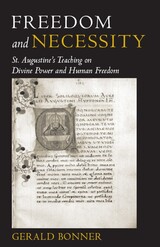
Freedom and Necessity
St. Augustine's Teaching on Divine Power and Human Freedom
Gerald Bonner
Catholic University of America Press, 2007
This book seeks to explain this paradox in Augustine's theology by tracing how these different emphases arose in his thought, and speculating as to why he endorsed, in the end, his theology of predestination. T
[more]
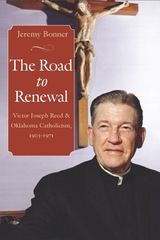
The Road to Renewal
Victor Joseph Reed and Oklahoma Catholicism, 1905–1971
Jeremy BONNER
Catholic University of America Press, 2008
The Road to Renewal offers an important contribution to the study of Catholicism in the 1960s. Grounded in thorough archival research, the book breaks new ground in its examination of the implementation of Vatican II at the diocesan level.
[more]
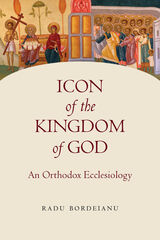
Icon of the Kingdom of God
An Orthodox Ecclesiology
Radu Bordeianu
Catholic University of America Press, 2023
What is the Church? Some would answer this question by studying the Scriptures, the history of the Church, and contemporary theologians, thus addressing the theological nature of the Church. Others would answer based on statistics, interviews, and personal observation, thus focusing on the experience of the Church. These theological and experiential perspectives are in tension, or at times even opposed. Whereas the first might speak about the local church as the diocese gathered in the Liturgy presided over by its bishop, the latter would describe the local church as the parish community celebrating the Liturgy together with the parish priest, never experiencing a sole liturgy that gathers an entire diocese around its bishop. Whereas a theologian might abstractly describe the Church as a reflection of the Trinity, a regular church-member might concretely experience the Church as a community that manifests the Kingdom of God in its outreach ministries. Radu Bordeianu attempts to bring these two perspectives together, starting from the concrete experience of the Church, engaging this experience with the theological tradition of the Church, extracting ecclesiological principles from this combined approach, and then highlighting concrete situations that reflect those standards or proposing correctives, when necessary.
Without pretending to be a complete Orthodox ecclesiology, Icon of the Kingdom of God addresses the most important topics related to the Church. It progresses according to one’s experience of the Church from baptism, to the family, parish, Liturgy, and priesthood, followed by analyses of synodality and nationality. Arguing that the Church is an icon of the Kingdom of God, this volume brings together the past theological heritage and the present experience of the Church while having three methodological characteristics: experiential, Kingdom-centered, and ecumenical.
[more]
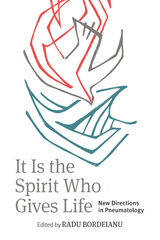
It is the Spirit Who Gives Life
New Directions in Pneumatology
Radu Bordeianu
Catholic University of America Press, 2022
Who is the Holy Spirit? What is the Holy Spirit? The answers to these questions were so obvious in the first centuries of Christian history, that the New Testament and the earliest Christian writers did not feel the need to deliberately address the identity of the Spirit. The more stringent question was this: what does the Spirit do in the Hebrew Scriptures, in the life of Jesus, in the community of disciples, in the Church, and in the world? These same questions, however, did not have the same obvious answers to subsequent generations.
Writing in the fourth century, Gregory of Nazianzus observed a slow progress of better understanding the identity and mission of the Holy Spirit throughout the centuries; his opponents still referred to the Spirit as a “strange,” “unscriptural,” and “interpolated” God (Or. 31). One would expect that today, centuries later, pneumatology would be exponentially further developed than in the patristic era. And yet, contemporary theology only rarely asks who the Spirit is and what the Spirit does. That is where the present volume attempts to bring a contribution, by addressing early Pneumatologies reflected in the Scriptures and the age of the martyrs, historical developments in patristic literature and spiritual writings, and contemporary pneumatological themes, as they relate to ecumenism, ecology, science, ecclesiology, and missions.
The present volume gathers essays authored by eleven world-renowned theologians. Each contribution originated as a public lecture addressed to theologians and an educated general audience, followed by a private colloquium in which the lecturers conferred with scholars who are experts in the field. Thus, the present volume offers a multifaceted approach to Pneumatology, in an ecumenical spirit.
[more]
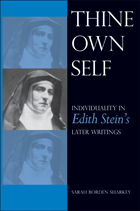
Thine Own Self
Individuality in Edith Stein's Later Writings
Sarah Borden Sharkey
Catholic University of America Press, 2010
Thine Own Self investigates Stein's account of human individuality and her mature philosophical positions on being and essence. Sarah Borden Sharkey shows how Stein's account of individual form adapts and updates the Aristotelian-Thomistic tradition in order to account for evolution and more contemporary insights in personality and individual distinctiveness.
[more]
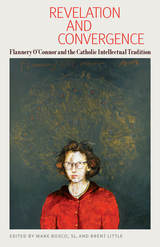
Revelation and Convergence
Mark Bosco
Catholic University of America Press, 2017
Revelation & Convergence brings together professors of literature, theology, and history to help both critics and readers better understand Flannery O’Connor’s religious imagination.
[more]
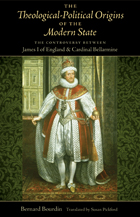
The Theological-Political Origins of the Modern State
The Controversy between James I of England and Cardinal Bellarmine
Bernard Bourdin
Catholic University of America Press, 2010
In this work, Bernard Bourdin clearly sets forth the political thought and theology of James I as an early intellectual foundation for the modern state
[more]
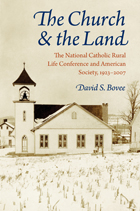
The Church and the Land
The National Catholic Rural Life Conference and American Society, 1923–2007
David S. Bovée
Catholic University of America Press, 2010
The Church and the Land is the first scholarly history of the Catholic rural life movement in the United States from its beginning in the 1920s to the present day. It tells the story of the men and women of the National Catholic Rural Life Conference (NCRLC) who labored to bring Catholic principles into effect to benefit the farm families, agricultural laborers, and others who lived in the American countrysid
[more]
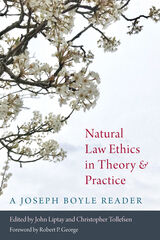
Natural Law Ethics in Theory and Practic
A Joseph Boyle Reader
Joseph Boyle
Catholic University of America Press, 2020
Natural Law Ethics in Theory and Practice brings together a selection of essays of the late Joseph Boyle. Boyle was, with Germain Grisez and John Finnis, a founder and developer of the New Classical Natural Law Theory, arguably the most important development in Catholic moral philosophy of the twentieth century. While this theory is indebted to the work of St. Thomas Aquinas, it incorporates an understanding and assessment of that work that is different from that found in other statements of natural law. Boyle made crucial contributions to a wide variety of aspects of this theory, and the volume is divided into two parts.
Part One: Articulating a Theory of Natural Law contains three sections in which Boyle defends the reality of free choice and the view that the basic reasons for action, or first principles of natural law, are incommensurable in goodness. Boyle identifies the basic moral standard for choice and action, and develops an account of human action that elucidates the important role played by intention and double effect in their moral evaluation.
The essays in Part Two: Natural Law Theory and Contemporary Moral Problems demonstrate the strength and scope of Boyle’s natural law account, as he brings it to bear upon just war theory, property and welfare rights, and issues in bioethics. The essays in bioethics address the difficult question of whether it is appropriate to tube-feed patients in persistent vegetative state, and include an unpublished essay, “Against Assisted Death,” which he delivered as the Anscombe Lecture at The Anscombe Bioethics Centre in Oxford about a year before he died.
This volume also includes a Foreword by Princeton’s Robert P. George; an Introduction by the editors that highlights Boyle’s contribution to the development of the new classical natural law theory; and a bibliography of Boyle’s publications.
Part One: Articulating a Theory of Natural Law contains three sections in which Boyle defends the reality of free choice and the view that the basic reasons for action, or first principles of natural law, are incommensurable in goodness. Boyle identifies the basic moral standard for choice and action, and develops an account of human action that elucidates the important role played by intention and double effect in their moral evaluation.
The essays in Part Two: Natural Law Theory and Contemporary Moral Problems demonstrate the strength and scope of Boyle’s natural law account, as he brings it to bear upon just war theory, property and welfare rights, and issues in bioethics. The essays in bioethics address the difficult question of whether it is appropriate to tube-feed patients in persistent vegetative state, and include an unpublished essay, “Against Assisted Death,” which he delivered as the Anscombe Lecture at The Anscombe Bioethics Centre in Oxford about a year before he died.
This volume also includes a Foreword by Princeton’s Robert P. George; an Introduction by the editors that highlights Boyle’s contribution to the development of the new classical natural law theory; and a bibliography of Boyle’s publications.
[more]
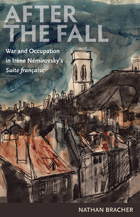
After the Fall
War and Occupation in Irène Némirovsky's Suite française
Nathan Bracher
Catholic University of America Press, 2010
In this work, the first critical monograph on Suite française, Nathan Bracher shows how, first amid the chaos and panic of the May-June 1940 debacle, and then within the unsettling new order of the German occupation, Némirovsky's novel casts a particularly revealing light on the behavior and attitudes of the French as well as on the highly problematic interaction of France's social classes
[more]
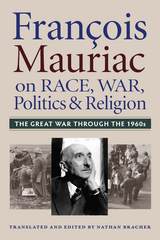
Francois Mauriac on Race, War, Politics and Religion
Nathan Bracher
Catholic University of America Press, 2016
Nathan Bracher's François Mauriac on Race, War, Politics, and Religion: The Great War Through the 1960s consists of a selection of some ninety editorials penned by the Catholic novelist and intellectual François Mauriac, who received the Nobel Prize for literature and who was admitted to the Académie Française in 1933. As is often the case for prominent writers and intellectuals in France, Mauriac became active in political punditry early in his career, at the time of the First World War. Intensifying notably in the tumultuous years of the 1930s on, this activity continues to expand over the next five decades. After 1952, Mauriac's editorials came to represent the most important dimension of his intellectual activity. He was, to cite the prominent journalist and intellectual Jean Daniel of Le Nouvel Observateur, Frances most distinguished and formidable editorialist of the twentieth century.
[more]
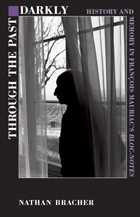
Through the Past Darkly
History and Memory in François Mauriac’s Bloc-notes
Nathan Bracher
Catholic University of America Press, 2004
This book, the first English-language study of Mauriac's Bloc-notes, presents these poignant, incisive editorials on social justice, war, and human rights in postwar France as both symptomatic of a culture imbued with the past and emblematic of a Christian humanist's ethical approach to history and memory.
[more]
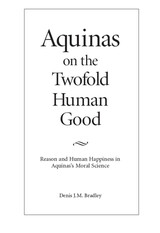
Aquinas on the Twofold Human Good
Reason and Human Happiness in Aquinas's Moral Science
Denis J. M. Bradley
Catholic University of America Press, 1997
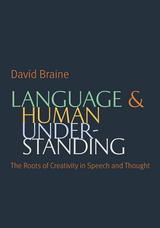
Language and Human Understanding
David Braine
Catholic University of America Press, 2014
Philosopher, psychologist and linguist are all concerned with natural language. Accordingly, in seeking a unified view, Braine draws on insights from all these fields, sifting through the discordant schools of linguists. He concludes that one extended logic or integrated semantic syntax shapes grammar, but without constricting languages to being of one grammatical type.
[more]
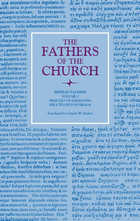
Iberian Fathers, Volume 2
Claude W. Braulio of Saragossa
Catholic University of America Press, 1969
In this second volume of translations from the Iberian Fathers appear the works of two seventh-century writers. From the first of these, bishop Braulio of Saragossa, a figure in Visigothic literature second only to St. Isidore of Seville, comes an extensive collection of letters. These are variously addressed to Isidore himself, to other ecclesiastics, to Pope Honorius, and to King Receswinth; friends and relatives were the recipients of seven letters of consolation. Braulio's letters are joined by the Life of a near contemporary, St. Emilian, and by a valuable list of the writings of Isidore, under whom Braulio studied. Fructuousus of Braga is represented by two monastic rules. The first of these was composed for Compludo, a foundation made by Fructousus himself; the other rule is a general or common one. Two other writings dealing with monastic practice accompany these rules, together with a letter to King Receswinth.
[more]
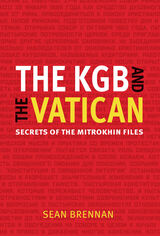
The KGB and the Vatican
Secrets of the Mitrokhin Files
Sean Brennan
Catholic University of America Press, 2022
One of the greatest ironies of the history of Soviet rule is that, for an officially atheistic state, those in the political police and in the Politburo devoted an enormous amount of time and attention to the question of religion. The Soviet government’s policies toward religious institutions in the USSR, and toward religious institutions in the non-Communist world, reflected this, especially when it came to the Vatican and Catholic Churches, both the Latin and Byzantine Rite, in Soviet territory. The KGB and the Vatican consists of the transcripts of KGB records concerning the policies of the Soviet secret police towards the Vatican and the Catholic Church in the Communist world, transcripts provided by KGB archivist and defector Vasili Mitrokhin, from the Second Vatican Council to the election of John Paul II. Among the topics covered include how the Soviet regime viewed the efforts of John XXIII and Paul VI of reaching out to eastern side of the Iron Curtain, the experience of the Roman Catholic Church in Lithuanian Soviet Socialist Republic and the underground Greek Catholic Church in the Ukrainian Soviet Socialist Republic, the religious underground in the key cities of Leningrad and Moscow, and finally the election of John Paul II and its effect on the tumultuous events in Poland in the late 1970s and early 1980s.
This valuable primary source collection also contains a historical introduction written by the translator, Sean Brennan, a professor of History at the University of Scranton.
[more]
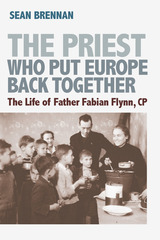
The Priest Who Put Europe Back Together
The Life of Rev. Fabian Flynn, CP
Sean Brennan
Catholic University of America Press, 2018
Philp Fabian Flynn led a remarkable life, bearing witness to some of the most pivotal events of the twentieth century. Flynn took part in the invasions of Sicily and Normandy, the Battle of Aachen, and the Battle of the Hürtgen Forest. He acted as confessor to Nazi War Criminals during the International Military Tribunal at Nuremberg, assisted Hungarian Revolutionaries on the streets of Budapest, and assisted the waves of refugees arriving in Austria feeling the effects of ethnic and political persecution during the Cold War. The Priest Who Put Europe Back Together tells the story of this fascinating life. From solidly middle-class beginnings in Dorchester, Massachusetts, Flynn interacted with and occasionally advised some of the major political, military, and religious leaders of his era. His legacy as a Passionist priest, a chaplain in the US Army, and an official in the Catholic Relief Services was both vast and enormously beneficial. His life and career symbolized the “coming of age” of the United States as a global superpower, and the corresponding growth of the American Catholic Church as an international institution. Both helped liberate half of Europe from Fascist rule, and then helped to rebuild its political, economic, and social foundations, which led to an unprecedented period of peace and prosperity. His efforts on behalf of both his country and his Church to contain Communist influence, and to assist the refugees of its tyranny, contributed to its collapse. Flynn was one of the hundreds of Americans who put Europe back together after a period of horrendous self-destruction. In a twentieth century filled with villains and despots, Flynn played a heroic and vital role in extraordinary times.
[more]
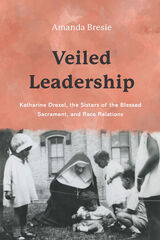
Veiled Leadership
Katharine Drexel, The Sisters of the Blessed Sacrament, and Race Relations
Amanda Bresie
Catholic University of America Press, 2023
On the rainy morning of October 1, 2000, Pope John Paul II canonized Mother Katharine Drexel. Born into a wealthy Philadelphia family, Drexel bucked society and formed the Sisters of the Blessed Sacrament for Indians and Colored People. Her compelling personal story has excited many biographers who have highlighted her holiness and catalogued her good deeds. During her life, newspapers called her the “Millionaire Nun,” and much of the literature on Drexel and the Sisters of the Blessed Sacrament exalts Katharine Drexel’s disbursement of her vast fortune to benefit Black and Indigenous people. The often repeated stories of a riches to rags holy woman miss the true significance of what Mother Katharine and the Sisters of the Blessed Sacrament attempted. Drexel was not merely the ATM of Catholic Home Missions; rather, she challenged the hierarchy to reimagine its mission in the United States. In an era when the Church controlled the actions and censored the opinions of women religious, they had to listen to Mother Katharine. Most writing on Drexel and the SBS focus on Drexel’s spiritual journey, but Veiled Leadership traces the daily operations of her charitable empire and looks at how the Sisters implemented Drexel’s vision in the field. The SBS were not always welcomed in the communities they served, and they experienced conflict from both white supremacists and the people they wanted to aid.
Veiled Leadership examines the lives of Mother Katharine and her congregation within the context of larger constructs of gender, race, religion, reform, and national identity. It explores what happens when a non-dominant culture tries to impose its views and morals on other non-dominant cultures. In other words, as outliers themselves—they were semi-cloistered Catholic women from primarily immigrant backgrounds in a culture that regarded their lifestyles as alien and unnatural—their attempts to Americanize and assimilate Black and Indigenous people, whose families had been in the country for generations longer than the nuns’ own, adds complexity to our understanding of cultural hegemony.
[more]
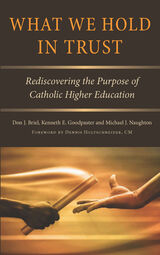
What We Hold in Trust
Rediscovering the Purpose of Catholic Higher Education
Don Briel
Catholic University of America Press, 2021
The specific concern in What We Hold in Trust comes to this: the Catholic university that sees its principal purpose in terms of the active life, of career, and of changing the world, undermines the contemplative and more deep-rooted purpose of the university. If a university adopts the language of technical and social change as its main and exclusive purpose, it will weaken the deeper roots of the university’s liberal arts and Catholic mission. The language of the activist, of changing the world through social justice, equality and inclusion, or of the technician through market-oriented incentives, plays an important role in university life. We need to change the world for the better and universities play an important role, but both the activist and technician will be co-opted by our age of hyper-activity and technocratic organizations if there is not first a contemplative outlook on the world that receives reality rather than constructs it.
To address this need for roots What We Hold in Trust unfolds in four chapters that will demonstrate how essential it is for the faculty, administrators, and trustees of Catholic universities to think philosophically and theologically (Chapter One), historically (Chapter Two) and institutionally (Chapters Three and Four). What we desperately need today are leaders in Catholic universities who understand the roots of the institutions they serve, who can wisely order the goods of the university, who know what is primary and what is secondary, and who can distinguish fads and slogans from authentic reform. We need leaders who are in touch with their history and have a love for tradition, and in particular for the Catholic tradition. Without this vision, our universities may grow in size, but shrink in purpose. They may be richer but not wiser.
[more]
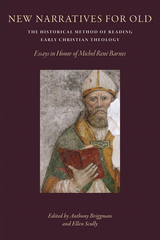
New Narratives for Old
The Historical Method of Reading Early Christian Theology: Essays in Honor of Michel Rene Barnes
Anthony Briggman
Catholic University of America Press, 2022
Guilds and conferences have grown up around historical theology, yet no volume has ever been dedicated to the definition and illustration of the method undergirding historical theology. This volume both defines and illustrates the methodology of historical theology, especially as it relates to the study of early Christianity, and situates historical theology among other methodological approaches to early Christianity, including confessional apologetics, constructive theology, and socio-cultural history.
Historical theology as a discipline stands in contrast to these other approaches to the study of early Christianity. In contrast to systematic or constructive approaches, it remains essentially historical, with a desire to elucidate the past rather than speak to the present. In contrast to socio-historical approaches, it remains essentially theological, with a concern to value and understand the full complexity of the abstract thought world that stands behind the textual tradition of early Christian theology. Moreover, historical theology is characterized by the methodological presupposition that, unless good reason exists to think otherwise, the theological accounts of the ancient church articulate the genuine beliefs of their authors.
The significance of this volume lies in the methodological definition it offers. The strength of this volume lies in the fact that its definition of the historical method of studying theology is not the work of a single mind but that of over twenty respected scholars, many of whom are leaders in the field. The volume begins with an introductory essay that orients readers to various approaches to early Christian literature, it moves to two technical essays that define the historical method of studying early Christian theology, and then it illustrates the practice of this method with more than twenty essays that cover a period stretching from the first century to the dawn of the seventh.
[more]
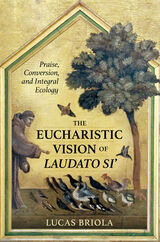
The Eucharistic Vision of Laudato Si
Praise, Conversion, and Integral Ecology
Lucas Briola
Catholic University of America Press, 2022
No other encyclical has generated as much conversation—both Catholic and non-Catholic—as Laudato si’. Often forgotten in these conversations is the theological heart and eucharistic vision of the encyclical and its integral ecology. Even the title of Laudato si’—“Praised be!”—signals the centrality of right praise in caring for our common home. Using Bernard Lonergan’s theology of history, this book unearths the doxological, eucharistic vision that shapes the encyclical’s integral presentation of social and ecological conversion. It offers the first book-length study that recovers the eucharistic nature of Laudato si’.
In drawing out the eucharistic vision of Laudato si’, the book accomplishes several feats for the reader. It roots the eucharistic dimensions of the encyclical in the writings of Popes John Paul II and Benedict XVI, showing how Pope Francis develops their thought in notable ways. It introduces Bernard Lonergan’s theology of history, showing how his framework can capture the eucharistic contours of caring for our common home; so too, in light of Laudato si’, does the book expand his theology of history to incorporate both ecological concern and the doxological, eucharistic essence of the church. The book assembles a liturgically shaped, systematic account of the church’s social mission. It joins poles otherwise sundered in a polarized church and world: between worship and justice, between concerns for human life and concerns for the natural world. Realizing the eucharistic vision of Laudato si’ promises much for our contemporary moment.
Pope Francis recently observed that the integral ecology of Laudato si’ holds the key for the world’s recovery from the COVID-19 pandemic. The U.S. Catholic Bishops recently launched a Eucharistic Revival that aims to rekindle eucharistic devotion and praxis. The Eucharistic Vision of Laudato Si’: Praise, Conversion, and Integral Ecology supplies a timely study that helps fulfill these intertwined calls.
[more]
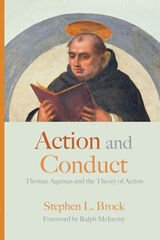
Action and Conduct
Thomas Aquinas and the Theory of Action
Stephen Brock
Catholic University of America Press, 2021
"Both Thomistic scholars and analytic philosophers interested in theories of human action and accountability will find this book a welcome addition to their libraries. Truly a substantive addition to both Thomistic scholarship and the ongoing analytic investigation into human action and responsible agency."—American Catholic Philosophical Quarterly
"A first-rate book...Brock's lucid and illuminating analysis offers much of value to both intellectual historians and theologians, as well as philosophers."—Theological Studies"Brock's treatment of Aquinas's account of action exhibits a rare combination of rigor and learning. It is, no doubt, the best we have."—The Thomist
"A first-rate book...Brock's lucid and illuminating analysis offers much of value to both intellectual historians and theologians, as well as philosophers."—Theological Studies"Brock's treatment of Aquinas's account of action exhibits a rare combination of rigor and learning. It is, no doubt, the best we have."—The Thomist
[more]
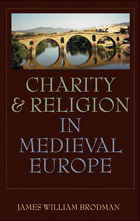
Charity and Religion in Medieval Europe
James William Brodman
Catholic University of America Press, 2009
Challenges conventional views of medieval piety by demonstrating how the ideology of charity and its vision of the active life provided an important alternative to the ascetical, contemplative tradition emphasized by most historians
[more]
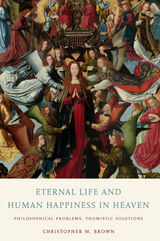
Eternal Life and Human Happiness in Heaven
Philosophical Problems, Thomistic Solutions
Christopher M. Brown
Catholic University of America Press, 2021
Eternal Life and Human Happiness in Heaven treats four apparent problems concerning eternal life in order to clarify our thinking about perfect human happiness in heaven. The teachings of St. Thomas Aquinas provide the basis for solutions to these four problems about eternal life insofar as his teachings call into question common contemporary theological or philosophical presuppositions about God, human persons, and the nature of heaven itself. Indeed, these Thomistic solutions often require us to think very differently from our contemporaries. But thinking differently with St. Thomas is worth it: for the Thomistic solutions to these apparent problems are more satisfying, on both theological and philosophical grounds, than a number of contemporary theological and philosophical approaches.
Christopher Brown deploys his argument in four sections. The first section lays out, in three chapters, four apparent problems concerning eternal life—Is heaven a mystical or social reality? Is heaven other-worldly or this-worldly? Is heaven static or dynamic? Won’t human persons eventually get bored in heaven? Brown then explains how and why some important contemporary Christian theologians and philosophers resolve these problems, and notes serious problems with each of these contemporary solutions. The second section explains, in five chapters, St. Thomas’ significant distinction between the essential reward of the saints in heaven and the accidental reward, and treats in detail his account of that in which the essential reward consists, namely, the beatific vision and the proper accidents of the vision (delight, joy, and charity). The third section treats, in five chapters, St. Thomas’ views on the multifaceted accidental reward in heaven, where the accidental reward includes, among other things, glorified human embodiment, participation in the communion of the saints, and the joy experienced by the saints in sensing God’s “new heavens and new earth.” Finally, section four argues, in four chapters, that St. Thomas’ views allow for powerful solutions to the four apparent problems about eternal life examined in the first section. These solutions are powerful because, not only are they consistent with authoritative, Catholic Christian Tradition, but they do not raise any of the significant theological or philosophical problems that attend the contemporary theological and philosophical solutions examined in the first section.
[more]
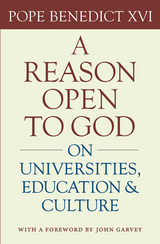
A Reason Open to God
Pope Benedict XVI Brown
Catholic University of America Press, 2013
With clarity and wisdom, Pope Benedict XVI sets out his vision for Catholic higher education in this first and only collection of his major addresses on the topic. What is the mission and identity of a Catholic university? What are the responsibilities of administrators, teachers, and students in Catholic institutes of higher learning? Where does the central theme of "love of God and others" fit into academia?
[more]
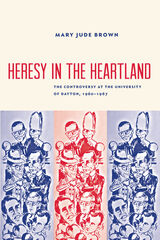
Heresy in the Heartland
The Controversy at The University of Dayton, 1960-67
Mary Jude Brown
Catholic University of America Press, 2022
Heresy in the Heartland is a narrative case study of the 'Heresy' Affair at the University of Dayton, a series of events predominantly in the philosophy department that occurred when tensions between the Thomists and proponents of new philosophies reached crisis stage in fall 1966. The controversy culminated in a letter written by a lay assistant professor to the Cincinnati archbishop, Karl J. Alter. In the letter, the professor cited a number of instances where “erroneous teachings” were “endorsed” or “openly advocated” by four lay faculty members. Concerned about the pastoral impact on the University of Dayton community, the professor asked the archbishop to conduct an investigation. How the University weathered this controversy, the second of three major controversies to hit Catholic higher education within three years (St. John’s University, University of Dayton and the Curran affair at Catholic University of America), is of interest to faculty and administrators in Catholic higher education who continue to struggle with defining what it means to be a “Catholic” university, with the relationship of Catholic universities to the Church at large and the hierarchy in particular, and with Church teachings that conflict with the culture we live in such as immigration, the environment and sexual ethics.
The story is told in chronological order by the participants in the controversy - faculty, administrators, students and clergy - using the words of those involved. Heresy in the Heartland concludes with a synopsis of what happened at the University of Dayton and draws some lessons for the future of Catholic higher education.
[more]
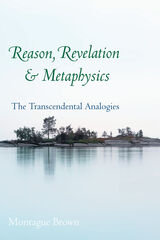
Reason, Revelation, and Metaphysics
Montague Brown
Catholic University of America Press, 2021
Any realist metaphysics must include an integrated account of the transcendentals and the analogy of being, for an adequate metaphysics must be about everything, and all things share in some key metaphysical characteristic—being, unity, truth, goodness, and beauty. However, they do not share in them in exactly the same way. Therefore, there is need to explain the transcendental characteristics in an analogical way. By using the phrase “transcendental analogies,” Reason, Revelation and Metaphysics claims that there are analogies of unity, truth, goodness, and beauty, which are related to, but irreducible to, the analogy of being. As this book is a systematic study of the topic, theoretical reason has primacy in the project and metaphysics is given pride of place. But reason is practical and aesthetic as well; that is, our consciences urge us to seek what is good, and we are delighted by what is beautiful. Although goodness and beauty are not reducible to truth, they must be included in any adequate metaphysical account, for metaphysics looks to explain everything.
Although metaphysics is traditionally thought to be a philosophical project involving ontology and natural theology, Montague Brown argues that an adequate metaphysics must ultimately be theological, including within its scope the truths of revelation. Philosophical reason’s examination of the transcendental analogies raises questions that it cannot answer. We experience a world of many beings, truths, goods, and beauties. Recognizing that these many instances have something in common, we affirm a transcendent instance of each (traditionally called God). However, although we know that a transcendent instance exists, we do not know its nature: therefore, we cannot say how it is related to the other instances. If we try to apply this transcendent instance as the prime analogate to shed light on the other analogates, we must fail, for the abstractness and universality of the transcendent instance can add nothing to our understanding of the particular instances. Wanting to know how the many exist and are related, philosophical reason finds no way forward and recognizes its need for help.
It is the thesis of this book that reason finds this help only in the revelation of the God’s covenantal relation with the world. The first principle of all things—most perfectly revealed in Jesus Christ, perfect God and perfect man—is really and freely related to us. Only by accepting this revealed prime analogate can the transcendental analogies bear fruit in our ongoing quest for understanding.
[more]
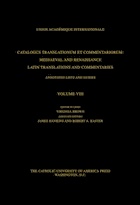
Catalogus Translationum et Commentariorum, Volume 8
Virginia Brown
Catholic University of America Press, 1960
Considered a definitive source for scholars and students, this highly acclaimed series illustrates the impact of Greek and Latin texts on the Middle Ages and Renaissance.
[more]
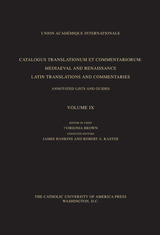
Catalogus Translationum et Commentariorum, Volume 9
Virginia Brown
Catholic University of America Press, 1960
Considered a definitive source for scholars and students, this highly acclaimed series illustrates the impact of Greek and Latin texts on the Middle Ages and Renaissance.
[more]
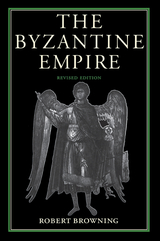
The Byzantine Empire (Revised Edition)
Robert Browning
Catholic University of America Press, 1992
This classic study presents the history of the Byzantine Empire from the sixth to the fifteenth century in terms of political events, art, literature, and thought. It is addressed to the general reader of history as well as to students and scholars.
[more]
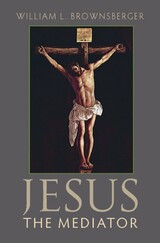
Jesus the Mediator
William Brownsberger
Catholic University of America Press, 2013
In Jesus the Mediator, William L. Brownsberger offers an account of the human psychology assumed by the Second Person of the Trinity in light of its salvific significance
[more]
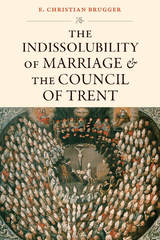
The Indissolubility of Marriage and the Council of Trent
E. Christian Brugger
Catholic University of America Press, 2017
This important volume examines the Catholic Church’s doctrine on the indissolubility of marriage as taught by the 16th century Ecumenical Council of Trent (1545-1563). In the Council’s reply to Reformation challenges on the sacraments, it took up the ques
[more]
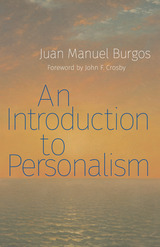
An Introduction to Personalism
Juan Manuel Burgos
Catholic University of America Press, 2018
Much has been written about the great personalist philosophers of the 20th century – including Jacques Maritain and Emmanuel Mournier, Martin Buber and Emmanuel Levinas, Dietrich von Hildebrand and Edith Stein, Max Scheler and Karol Wojtyla (later Pope John Paul II) – but few books cover the personalist movement as a whole. An Introduction to Personalism fills that gap.
Juan Manuel Burgos shows the reader how personalist philosophy was born in response to the tragedies of two World Wars, the Great Depression, and the totalitarian regimes of the 1930s. Through a revitalization of the concept of the person, an array of thinkers developed a philosophy both rooted in the best of the intellectual tradition and capable of dialoguing with contemporary concerns.
Burgos then delves into the potent ideas of more than twenty thinkers who have contributed to the growth of personalism, including Romano Guardini, Gabriel Marcel, Xavier Zubiri, and Michael Polanyi. Burgos’s encyclopedic knowledge of the movement allows for a concise and well-rounded perspective on each of the personalists studied.
An Introduction to Personalism concludes with a synthesis of personalist thought, bringing together the brightest insights of each personalist philosopher into an organic whole. Burgos argues that personalism is not an eclectic hodge-podge, but a full-fledged school of philosophy, and gives a dynamic and rigorous exposition of the key features of the personalist position.
Our times are marked by numerous and often contradictory ideas about the human person. An Introduction to Personalism presents an engaging anthropological vision capable of taking the lead in the debate about the meaning of human existence and of winning hearts and minds for the cause of the dignity of every person in the 21st century and beyond.
Juan Manuel Burgos shows the reader how personalist philosophy was born in response to the tragedies of two World Wars, the Great Depression, and the totalitarian regimes of the 1930s. Through a revitalization of the concept of the person, an array of thinkers developed a philosophy both rooted in the best of the intellectual tradition and capable of dialoguing with contemporary concerns.
Burgos then delves into the potent ideas of more than twenty thinkers who have contributed to the growth of personalism, including Romano Guardini, Gabriel Marcel, Xavier Zubiri, and Michael Polanyi. Burgos’s encyclopedic knowledge of the movement allows for a concise and well-rounded perspective on each of the personalists studied.
An Introduction to Personalism concludes with a synthesis of personalist thought, bringing together the brightest insights of each personalist philosopher into an organic whole. Burgos argues that personalism is not an eclectic hodge-podge, but a full-fledged school of philosophy, and gives a dynamic and rigorous exposition of the key features of the personalist position.
Our times are marked by numerous and often contradictory ideas about the human person. An Introduction to Personalism presents an engaging anthropological vision capable of taking the lead in the debate about the meaning of human existence and of winning hearts and minds for the cause of the dignity of every person in the 21st century and beyond.
[more]
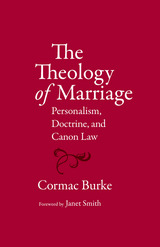
The Theology of Marriage
Cormac Burke
Catholic University of America Press, 2015
Please fill in marketing copy
[more]
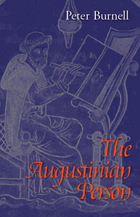
The Augustinian Person
Peter Burnell
Catholic University of America Press, 2005
Through careful analysis of Augustine's writings, Burnell concludes that Augustine conceives of human nature as a unity at every level--socially, morally, and in basic constitution--despite very common objections that he fails to achieve such a conception
[more]
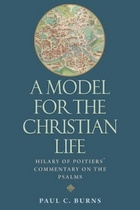
A Model for the Christian Life
Hilary of Poitier's Commentary on the Psalms
Paul C. Burns
Catholic University of America Press, 2012
In this examination of Hilary's treatise, Paul C. Burns discusses the intended audience of Hilary's text and the use of the Psalms by Christians in the fourth century. He identifies Hilary's distinctive perspectives; his dependence on Origen; his Latin theological and exegetical tradition; and the creative directions of Hilary's thought.
[more]
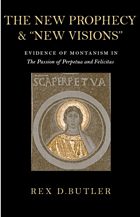
The New Prophecy and "New Visions"
Evidence of Montanism in The Passion of Perpetua and Felicitas (Patristic Monograph Series, Volume 18)
Rex D. Butler
Catholic University of America Press, 2006
In this book, Rex D. Butler examines the Passion for evidence of Montanism and proposes that its three authors--Perpetua, Saturus, and the unnamed editor--were Montanists.
[more]
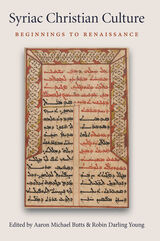
Syriac Christian Culture
Beginnings to Renaissance
Aaron Michael Butts
Catholic University of America Press, 2021
Syriac Christianity developed in the first centuries CE in the Middle East, where it continued to flourish throughout Late Antiquity and the Medieval period, while also spreading widely, as far as India and China. Today, Syriac Christians are found in the Middle East, in India, as well in diasporas scattered across the globe. Over this extended time period and across this vast geographic expanse, Syriac Christians have built impressive churches and monasteries, crafted fine pieces of art, and written and transmitted a sizable body of literature. Though often overlooked, neglected, and even persecuted, Syriac Christianity has been – and continues to be – an important part of the humanistic heritage of the last two millennia.
The present volume brings together fourteen studies that offer fresh perspectives on Syriac Christianity, especially its literary texts and authors. The timeframes of the individual studies span from the second-century Syriac translation of the Hebrew Bible up to the thirteenth century with the end of the Syriac Renaissance. Several studies analyze key authors from Late Antiquity, such as Aphrahat, Ephrem, Narsai, and Jacob of Serugh. Others investigate translations into Syriac, both from Hebrew and from Greek, while still others examine hagiography, especially its formation and transmission. Reflecting a growing trend in the field, the volume also devotes significant attention to the Medieval period, during which Syriac Christians lived under Islamic rule. The studies in the volume are united in their quest to explore the richness, diversity, and vibrance of Syriac Christianity.
[more]
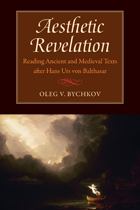
Aesthetic Revelation
Reading Ancient and Medieval Texts after Hans Urs von Balthasar
Oleg Bychkov
Catholic University of America Press, 2010
Oleg Bychkov's masterly exposition also shows how the texts analyzed have significantly influenced the development of Western theological thought.
[more]
READERS
Browse our collection.
PUBLISHERS
See BiblioVault's publisher services.
STUDENT SERVICES
Files for college accessibility offices.
UChicago Accessibility Resources
home | accessibility | search | about | contact us
BiblioVault ® 2001 - 2024
The University of Chicago Press




